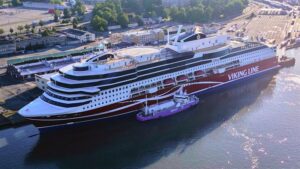Viking Line to fuel vessels with biogas in “first Baltic Sea green corridor”

The move is in celebration of Baltic Sea Day, and introduces the first green corridor ever on the Baltic Sea, between Turku and Stockholm.
Viking Glory and Viking Grace will only use liquefied biogas (LBG), instead of standard liquefied natural gas (LNG).
Normally, LNG is used on the Turku route, and this fuel has significantly lower nitrogen oxide emissions than the heavy fuel oil traditionally used on vessels.
Both LNG and LBG generate virtually no harmful sulphur or particle emissions.
During the week, a reduction of about 2,600 tonnes of greenhouse gas emissions (GHG) emissions will occur.
“This is an historic moment for us, the Baltic Sea and maritime transport. Scheduled service has never before been powered solely by biofuel. We have invested 450 million euros in our climate-smart vessels Viking Grace and Viking Glory, and one of their most important features is that they can run on LNG, biofuel and future synthetic fuels produced from renewable energy.
"Such significant environmental measures are the result of our long-term work,” said Viking Line’s sustainability manager, Dani Lindberg.
Viking Line’s biogas is supplied by Gasum, which makes the fuel from food and agricultural waste.
The biogas is produced in Europe, and the origin of each gas consignment is clearly documented.
“We have already operated Viking Grace using biogas on our Turku route, and passengers and cargo customers on Viking Glory and Viking Grace also already have the option to purchase biogas when they book their trip to offset the fuel used for their own travel and thus reduce the emissions for their trip by up to 90%," continued Lindberg.
"Now, for the first time, we are operating for a whole week using only biogas, which is unique. There is still limited access to renewable fuels, and the price for such fuels is at least twice as high compared to LNG. It is important to create demand in order for supply to rise and the price to fall.”
















